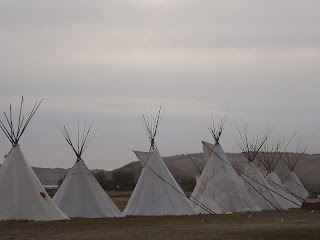I'm walking down the lane and as I turn left onto the valley floor I remember that I am presenting to the Fort Qu'Appelle Chamber of Commerce today at lunch. Kerri Ward, Economic Development Officer, had wanted someone connected with the Treaty Four Gathering to speak to the monthly meeting, but she was unsuccessful landing someone who could get away from prior commitments. I am plan B.
I plan my talk as I walk past moose meat hanging over a fire, past the tipi villiage, past the Treaty Four Governance Centre, past the All Nations Healing Hospital. Do I focus on my Treaty Walks? Do I focus on Treaty Education? Do I share the Building Bridges to Treaty Days program that Keitha and I facilitated last weekend at Calling Lakes?
It's noon and I am standing in the second floor dining area at the golf course. There is a long table made by pulling smaller tables together. Monica and Jaymss, two old students, are bringing coffee and serving soup and sandwiches.
"I am the least of these who could be speaking to you today," I say, explaining that Kerri had tried to find someone more closely involved with Treaty Four. "But I appreciate the opportunity to share what I have been learning. First, let me tell you how much I appreciate the active role of the chamber in our community. You are like my principal, Cathy Cochrane, who is in the hallways of our school, having the pulse of what's going on. I understand that you have your meetings in a variety of places, and that's encouraging to me.
"Another confession is that I come from a family of teachers and social workers. There aren't very many business people, so I'm just starting to understand the mindset of business people. In fact, it's been through my connection with the Fine Lifestyles Magazine and interviewing people, I've started to hear the heart and vision of business people. I'm learning what you already know: Business people are not just interested in the bottom line, you are community builders. You have passion.
I talk a little of my Treaty Walks story, walking all last year, blogging about treaty. I talk about the three principals on which treaty was formed, the Cree words: Miyowicehtowin,Witaskewin, Pimacihowin (see Day Seven http://www.treatywalks.blogspot.ca/2011/09/day-seven-miyowicehtowinwitaskewin.html ) getting along, living on the land together, and making a living. I share that I believe the treaties, our treaty four, is a beautiful document explaining that we can get along. That those First Nations leaders were intelligent and articulate; how Noel Starblanket explained to us last weekend what a significant role the women played who were back at the camps and when the men returned from negotiating, the women made sure they didn't forget key points, especially providing for their unborn children. Elder Starblanket had said, "They were thinking of me, of us, right here today."
"When we think of living together on the land, this is a hard one, because the crown had the world view that land could be bought and sold; the First Nations believed the land could not be bought and sold, but could be shared, as the many nations had shared the land for centuries. This has been a big treaty issue and continues to be.
"The third principal, making a living is particularly misunderstood today, I believe. People have stereotypes that First Nations people don't want to work, are lazy, but do we know our country's history? Do we realize the impact of residential schools, land grabs, disenfranchisement, disease, captivity on reserves under Indian agents, and economic strangulation under the Indian Act and the pass and permit system?
I story tell my own small enlightenment when Michael and I were driving to Regina once, with our daughters in the back of the vehicle. He began to tell me of a story he heard from an elder. She had been taken from her home at three years old, and not returned until she was thirteen. I broke into tears. "I can't hear this," I said. In the back seat our oldest was thirteen and our youngest was three. Part of my privilege is I can choose to stop listening when it starts to hurt, but even that small hurt, imagining losing my babies, was a strong emotional education.
I hold three fingers up and repeat the concepts: getting along, living together on the land, and making a living.
"You, the business leaders have a strong role to play in the healing of our country, especially in the area of making a living. I am encouraged to see your willingness to educate yourself, understand our history, so we can make a better Canada.
Two of the business women in town linger with me and we discuss ways that the business community can begin new bridge building. I am encouraged by their passion and insights.
A young man I don't recognize, so he wasn't a student, had been leaning on the counter by the register, listening to my words. After everyone has left, he comes and shakes my hand. "I really liked what you said," he says. "Especially that part about us not wanting work. That's just not true. We want to work, but our families are sometimes having troubles."
Jaymss comes over and I get a hug from her. "I miss school," she says. "That was good. I haven't been in class for a long time." We laugh.
I tell both young people how much their encouragement means to me.
I walk out the door; it's beautiful, crisp autumn. I walk past the sign reminding us of the first RCMP post here in the Fort, 1875 to 1880. One hundred thirty seven years ago, one year after the signing of treaty four, the newcomers looked over this valley, and the rest is history.








No comments:
Post a Comment